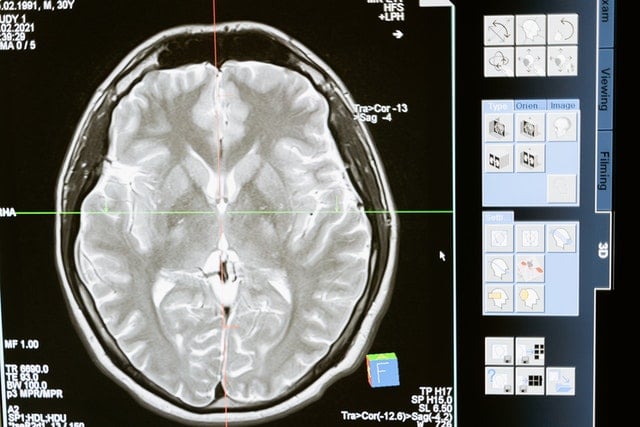Researchers have linked rheumatoid arthritis to faster cognitive decline in people with dementia — further evidence of a connection between chronic inflammation and poor brain health.
Many people experience painful swelling in their joints, especially as they get older. Last year, the CDC reported that more than half of adults over 75 years old have arthritis. Most of those cases are osteoarthritis, which affects specific body parts like the hands and knees that accumulate a lot of wear and tear over the course of a life. But there are many other conditions that can cause inflammation in the joints.
By age 55, around five percent of women and about half as many men will develop rheumatoid arthritis. Unlike osteoarthritis in which swelling occurs in a specific joint that has been damaged, rheumatoid arthritis is a systemic inflammatory condition in which overactive immune cells attack joints throughout the body.
Hong Xu, a nephrologist at Karolinska University in Sweden, realized that rheumatoid arthritis is not all that dissimilar from chronic kidney disease, which causes widespread inflammation due to the buildup of toxins that would normally be filtered out of the blood. In 2021, Xu linked kidney disease to an increased risk for vascular dementia and, to a lesser extent, Alzheimer’s. Other studies have also linked higher levels of inflammatory biomarkers and pro-inflammatory diets to dementia.
“All these chronic inflammatory diseases might contribute to the neural inflammation” that accompanies dementia — Xu told Being Patient.
In search of evidence to support this hypothesis, Xu and her team analyzed data from a national Swedish registry. They found that people with both dementia and rheumatoid arthritis did indeed show faster cognitive decline and an increased risk of death, according to a study recently published in Neurology.
Xu looked at data from people diagnosed with any form of dementia between 2007 and 2018. She used annual scores on the 30-point Mini Mental State Examination to track changes in cognitive ability and consulted Sweden’s Cause of Death Registry to determine if and when people included in the study died.
What she and her team saw was that, every year following their initial diagnosis with dementia, the risk of death for people with rheumatoid arthritis grew by about 15 percent compared to that of people without the autoimmune disorder. However, the immediate cause of death varied, ranging from neurological and cardiovascular disease to cancer and respiratory disease.
People with both dementia and rheumatoid arthritis also lost 0.24 more points on their annual MMSE score than people with dementia alone. “At each year, it’s not a big deal,” said Xu. But over the course of five or 10 years, that extra decrease adds up, and it could mean a person reaches a more severe stage of dementia more quickly.
Xu’s results were consistent with previous research. In 2021, Elena Myasoedova, a rheumatologist at the Mayo Clinic, found that residents of Olmstead County, Minnesota who had rheumatoid arthritis were about 37 percent more likely to receive a diagnosis of dementia later in life. Together, the two studies link rheumatoid arthritis to the progression of dementia symptoms across a person’s lifetime.
But Myasoedova’s study also provided a source of optimism: When she analyzed participants’ health according to the decade of their rheumatoid arthritis diagnosis, she noticed that the risk of a subsequent dementia diagnosis had declined since the turn of the century. She said that decline has become even more pronounced after 2010. She saw a similar trend when she examined the connection between rheumatoid arthritis and cardiovascular disease.
“That’s when major treatments occurred in rheumatology,” Myasoedova told Being Patient. Today, patients are undergoing treatments to manage their inflammation that are both earlier and more aggressive — and that could explain better outcomes for their overall health later in life.
In the new study, Xu just considered rheumatoid arthritis medications as a proxy for disease severity, because people who had uncontrolled symptoms were more likely to be taking medications to get their inflammation under control. But moving forward, she wants to go back and use a different set of analyses to see if anti-inflammatories might help people with dementia and rheumatoid arthritis slow down their rate of cognitive decline.
At the same time, Xu plans to investigate the link between other systemic inflammatory disorders and dementia. She’s currently in the middle of a study focused on inflammatory bowel disease.
For her part, Myasoedova will maintain her focus on rheumatoid arthritis, but she is confident that a deeper understanding of the disease will lead to widely applicable insights. “Rheumatoid arthritis presents sort of a model condition,” said Myasoedova. People with the disorder experience excessive inflammation at a relatively young age, but the rest of the population often catches up with them later in life.
For every breakthrough that improves symptom management or gets closer to a real cure for rheumatoid arthritis, Myasoedova says the next question may be, “How does it potentially translate for people who don’t have [a] chronic inflammatory condition but accumulate inflammation as they age?”
Andrew Saintswing (@AndrewSaintsing) earned a PhD in biology, and now he writes about science for outlets like Drug Discovery News.




